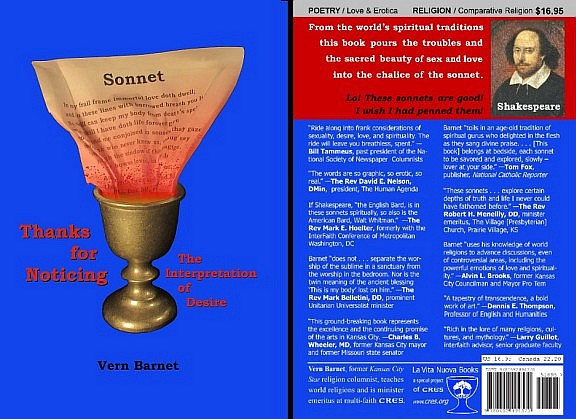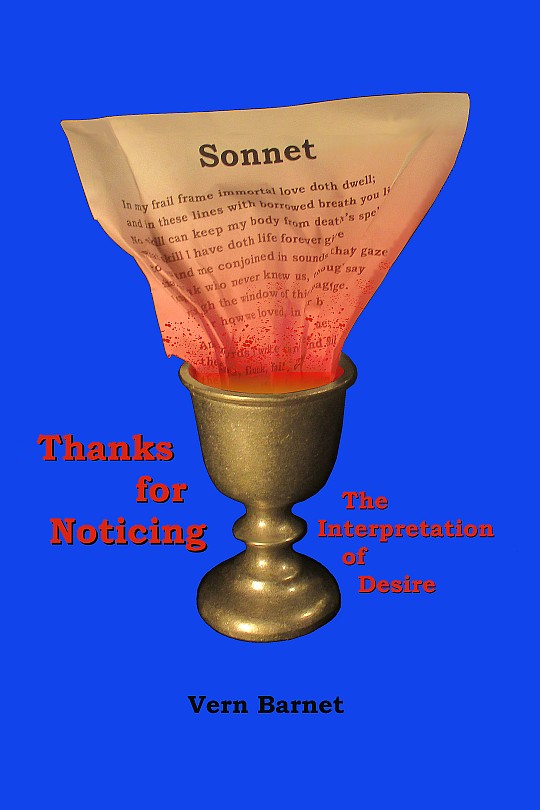Welcome, welcome, indeed!
INVITATION
about a sonnet in my 2026 revision is welcomed.
To post your comment or for more information, write vern@cres.org.

My 2015 prosimetrum with 154 sonnets, Thanks for Noticing: The Interpretation of Desire, locally sold out quickly. I'm now about ready to publish a revision, and the existing "blurbs" and reviews of the book are already excellent and need no changes.
For a wider reach, I am collecting commentary on specific sonnets to be published as a companion volume and on line. These comments will be introduced with a note that commentators are responding only to specific sonnets and have not reviewed the entire book.
 I
am not asking you to be a literary critic; just write about how you
respond to the sonnet (and the epigrams and notes if they are
meaningful to you). I
want honest comments from many perspectives: disagreeable comments are
certainly welcome. I'm not fishing for praise; and argument,
qualification, or displeasure would validate the collection of
comments as much as encomiums. So whatever you write will not only be
welcome but helpful.
I
am not asking you to be a literary critic; just write about how you
respond to the sonnet (and the epigrams and notes if they are
meaningful to you). I
want honest comments from many perspectives: disagreeable comments are
certainly welcome. I'm not fishing for praise; and argument,
qualification, or displeasure would validate the collection of
comments as much as encomiums. So whatever you write will not only be
welcome but helpful.I may have picked a particular sonnet or several from which you can choose. Otherwise, I'll ask for your help to select the sonnet.
Comments can explore the meaning of the sonnet or tangents to the sonnet you'd like to write about — political, musical, scientific, religious, legal, musical, sexual, scientific, literary, nautical, social, psychological, or any other interest the sonnet might call to mind. A few folks might want to discuss its technical features or how it reflects (or fails to reflect) Shakespeare's 1609 Sonnets.
Maybe four to twelve paragraphs, but whatever you do will be most welcome. Perhaps you'd like some sparks. Unless you prefer to be Anonymous, please provide a bio so you can be properly credited.
Some folks like more explicit directions, like HERE
which also links to additional background and resources --
¤What is a sonnet? ¤What's the book about? ¤Videos?
¤What's with Shakepeare's sonnets? ¤My bio? ¤Etc?





#suggestions
0. Right now I particularly solicit comments on specific sonnets.
1. If you want to comment on the book, please know that I am grateful for whatever you might say -- positive, hostile, questioning, auguring, reframing. You will help draw attention to -- help others notice -- the revised book by whatever you say. Length is entirely up to you, from a sentence to a long-form essay.
If you don't want to comment, please know that I am grateful for whatever attention you care to give to the book, and I hope you find some interest and maybe pleasure from it.
2. If you write without the chance to review the whole book and are cautious about the more scandalous/blasphemous/profane sonnets, they are indicated in the revision by a dash on either side of the page number in the Contents (pages 6-7); the page numbers are 50 + the sonnet numbers. These 29 sonnets (19% of the book) might be considered problematical:
GLORIA -- 25, 43, 55,
CONFITEOR -- 90, 101
SANCTUS ET BENEDICTUS -- 113-115, 118-125, 127-135
AGNUS DEI -- 139, 143, 146, 148.
Those who write without a chance to review the whole book will have a note appended to their comments indicating they are responding only to the specific identified sonnet(s).
3. You can write about a particular sonnet, or a pair, or group of them, or about any part of the book, or the book as a whole. If you want a suggestion from me, I'll probably have one, if I haven't already offered an idea or two!
4. Below the blue bar are General Questions. Before you scroll down --
Here are some more specific themes and approaches --
* the organization of the book by parts of the Mass
* comparisons with Shakespeare (and/or other sonnet writers)
* sexuality and/or spirituality
* use of world religions
or a particular tradition such as Christianity, Buddhism, Islam, etc.
* musical references (or just opera references)
* the musicality of the sonnets as a technical achievement or failure
* use of, and variations in, the sonnet form
* aids included in the book, such as
the Foreword, the Introduction, the Collect for Purity
the guide to reading sonnets (pages 220-221)
suggested reading schedules (page 48)
and other appendices.
5. Feel free to contact me vern@cres.org if you have questions or to offer and post your comment. For example, if you want me to identify all the sonnets that employ sea metaphors, or all referring to T S Eliot, or all the sonnets in Petrarchan form, just let me know.
Vern






#questions #sparks
¤ The English sonnet form 1 page PDF ¤ How to read sonnets ffolder PDF
Four Sets of Sparks:
General Questions
But I worry that these suggestions below tend
to shape responses for a literature course
when what I really want is
your personal response.
ONE. Matthew Arnold, in writings like The Function of Criticism at the Present Time (1864), suggests something like three steps in evaluating a piece of literature:
1. What did the writer try to do?
2. Was the writer successful?
3. Was it worth doing?
TWO. W. H. Auden's questions are in The Dyer’s Hand: "The questions which interest me most when reading a poem are two.
[1] The first is technical: Here is a verbal contraption. How does it work?
[2] The second is, in the broadest sense, moral: What kind of guy [sexism noted] inhabits this poem? What is his notion of the good life or the good place? His notion of the Evil One? What does he conceal from the reader? What does he conceal even from himself?"
THREE. ART FORM GUIDE in brief
literature, opera and other musical forms, painting, sculpture, architecture, theater, video, dance, worship, and other arts
1. Objective — What do you see/have you seen/heard/etc — scenes, objects, dialog, characters, events, shapes, movements, etc.
2. Reflective — What objects, emotions, moods, themes became symbols for larger meaning?
3. Interpretive — What is the work of art about? What would aliens learn about humanity from it? What is its message?
4. Decisive — How would you title or summarize this art? What personal experiences or historical circumstances does it prompt? How does it affect your future? How might it enlarge (or diminish) your understanding of yourself and the world?
FOUR. CONTEXTUAL QUESTIONS
Another set of general questions that can guide critical analysis of any work of art:
1. What is the work trying to communicate or express? What appears to be the central themes, messages, or emotions conveyed through the work, explicitly or implied?
2. How does the form serve the content? How do the techniques, structure, style, or medium enhance or complicate the work's meaning and effect?
3. What is the relationship between the work and its historical or cultural context? How does the piece reflect, respond to, or challenge the social, political, or artistic expectations of its culture?
4.How does the work engage with or depart from established conventions? Are traditional forms and presentation format and venues followed, or do you perceive innovation?
5. What is the work's emotional or psychological impact on the audience? How might your assessment of the work be similar or diverge from others who experience this work? Why would responses be different or similar?
6. How do the work's various elements interact with each other? How do the components of the specific medium help to create the whole? (Examples: NOVEL--characters and plot, PAINTING- color and composition, MUSIC--instruments, structure, DANCE--movement and costume, POETRY--sound and images.
7. What questions does the work raise that it doesn't answer? Do you find ambiguities, contradictions, or open-ended aspects that invite multiple interpretations or ongoing reflection? Is the impact weak so you can forget it after your exposure or do you want to cherish it for a time?
8. How
does the work reveal or conceal the artist's presence?
Is the creator eager to known and to be identified with this work otr
is there a traditional sensibility which makes the creator's identity
relatively unimortant? How does this affect how you esperience this
work?
manner, music, message
For
more information or to send me your comment,
write me at vern@cres.org.